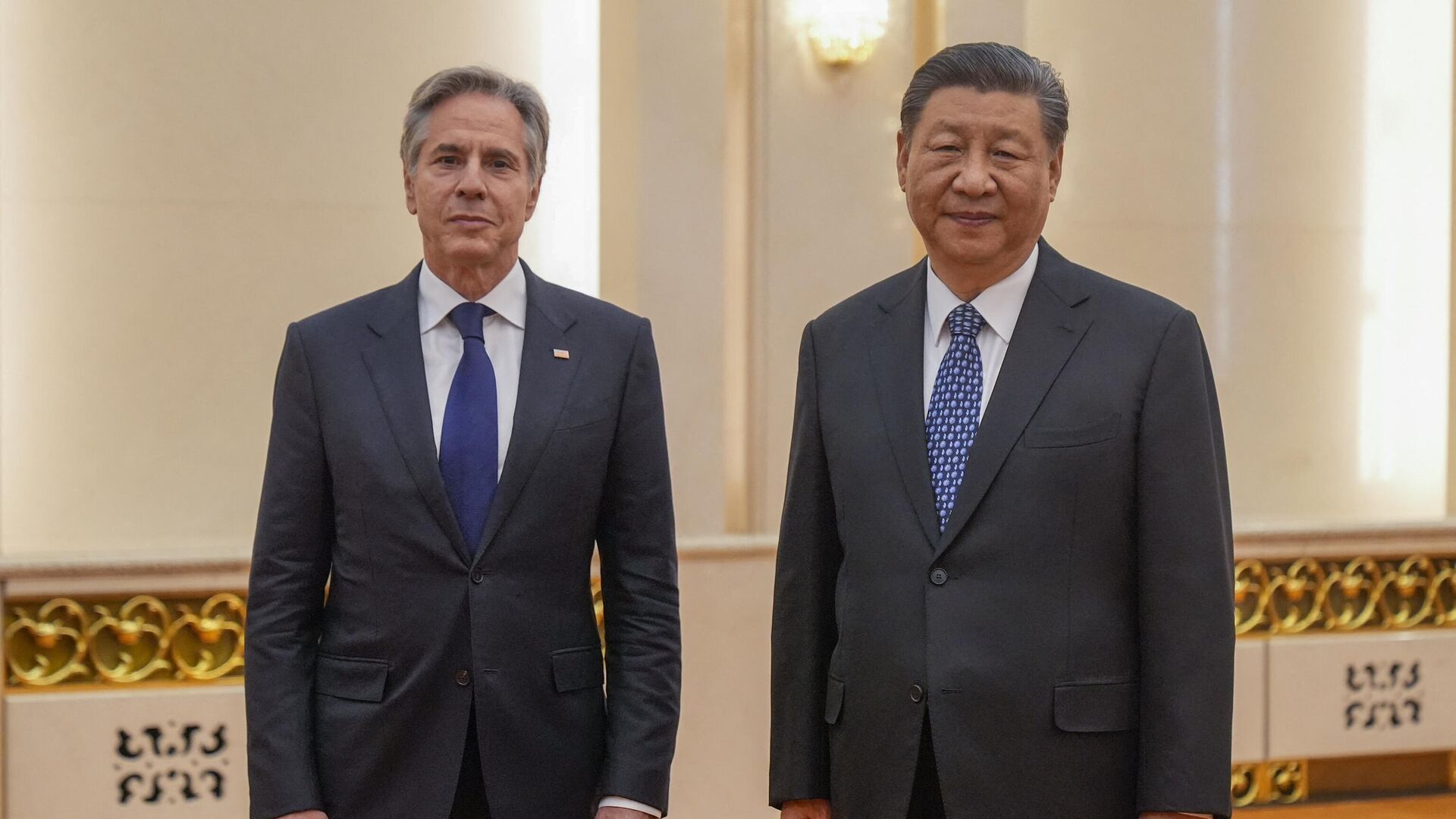https://sputnikglobe.com/20240427/why-united-states-wants-to-curb-chinas-economic-advance-1118149557.html
Why United States Wants to Curb China's Economic Advance
Why United States Wants to Curb China's Economic Advance
Sputnik International
US Secretary of State Antony Blinken’s recent visit to China has, among other things, highlighted Washington’s fondness of using threats and ultimatums as negotiating tactics.
2024-04-27T19:00+0000
2024-04-27T19:00+0000
2024-04-27T19:00+0000
analysis
china
alexei maslov
antony blinken
us
relations
https://cdn1.img.sputnikglobe.com/img/07e8/04/1b/1118149745_0:0:3071:1728_1920x0_80_0_0_b93421af59e41366a2b43325d7a34b7f.jpg
Blinken’s primary goal was to clarify the United States’ stance on China and all countries who independently shape their respective policies towards Russia and regarding Asia’s development, according to Alexei Maslov, director of the Moscow State University’s Institute of Asian and African Studies. The United States essentially wants China to stop its technological and financial assistance to Russia, as well as to decrease government support to Chinese companies that operate on Western markets, Maslov tells Sputnik, noting that these demands were delivered in the form of an ultimatum. He points out that the US has already revealed how it might try to pressure China into doing Washington’s bidding.These measures include tripling the existing tariffs on Chinese steel and aluminum exports; ramping up restrictions against Chinese banks, up to cutting off some of these banks from SWIFT; and landing sanctions against certain Chinese companies that would be prevented from exporting their products to the US. China, however, firmly stated that it is going to decide for itself with whom to trade, Maslov remarks, noting that Beijing did offer to Washington to resolve their differences through negotiations.The United States was content to watch China expand its trading policies, as long as China did not enter the stage of high tech development and Chinese technologies started to compete with the US and Western technologies in the market. Thus, Maslov explains, the United States wants China to remain a “world factory” and to manufacture consumer products for Western countries and for ASEAN nations, whereas the high tech sphere must remain the domain of the United States and the Western world. According to the scholar, this is not really a trade matter – this is about the ability to shape the future, and the United States wants to maintain a monopoly on that.Maslov also observed that, despite the United States’ efforts to gain an advantage over China in microelectronics via the so-called CHIPS Act, which was meant to boost semiconductor development in the US, China is rapidly closing this gap, already being capable of producing five-nanometer chips and “microchips with artificial intelligence.” Though the CHIPS Act did harm China’s interests, as well as the interests of many other countries, Maslov suggested that this is a “temporary issue” that is unlikely to benefit the United States in the long run.Meanwhile, China has made considerable progress in areas such as genetic engineering and microelectronics while lagging behind other countries in others, as avionics. What sets China apart from other Western powers is the fact that the implementation of any new technology is about 30% cheaper for Beijing than for them, which means that Chinese products would be cheaper than their Western analogues, Maslov explains.
https://sputnikglobe.com/20240427/us-encircling-china-with-military-bases-to-cut-off-ocean-access-in-conflict-scenario---reports-1118142625.html
china
Sputnik International
feedback@sputniknews.com
+74956456601
MIA „Rosiya Segodnya“
2024
Sputnik International
feedback@sputniknews.com
+74956456601
MIA „Rosiya Segodnya“
News
en_EN
Sputnik International
feedback@sputniknews.com
+74956456601
MIA „Rosiya Segodnya“
Sputnik International
feedback@sputniknews.com
+74956456601
MIA „Rosiya Segodnya“
us china relations, antony blinken visit to china, chinese economy overtake us
us china relations, antony blinken visit to china, chinese economy overtake us
Why United States Wants to Curb China's Economic Advance
US Secretary of State Antony Blinken’s recent visit to China has, among other things, highlighted Washington’s fondness of using threats and ultimatums as negotiating tactics.
Blinken’s primary goal was to clarify the United States’ stance on China and all countries who independently shape their respective
policies towards Russia and regarding Asia’s development, according to Alexei Maslov, director of the Moscow State University’s Institute of Asian and African Studies.
The United States essentially wants China to stop its technological and financial assistance to Russia, as well as to decrease government support to Chinese companies that operate on Western markets, Maslov tells Sputnik, noting that these demands were delivered in the form of an ultimatum.
He points out that the US has already revealed how it might try to
pressure China into doing Washington’s bidding.
These measures include tripling the existing tariffs on Chinese steel and aluminum exports; ramping up restrictions against Chinese banks, up to cutting off some of these banks from SWIFT; and landing sanctions against certain Chinese companies that would be prevented from exporting their products to the US.
China, however, firmly stated that it is going to decide for itself with whom to trade, Maslov remarks, noting that Beijing did offer to Washington to resolve their differences through negotiations.
“China has adopted a lot less harsh and extremist stance, offering to resolve matters through negotiations, as they usually do, by saying that there is enough room on Earth for the United States and for China and that there is no need to engage in serious quarrels,” he said. “This stance of China directly contradicts the offer made by the US. And while, in my opinion, there has been no deterioration of relations [between China and the United States] – furthermore, the expansion of trade was discussed – we have not seen any meaningful improvements either.”
The United States was content to watch China expand its trading policies, as long as China did not enter the stage of high tech development and Chinese technologies started to compete with the US and Western technologies in the market.
Thus, Maslov explains, the United States wants China to remain a “world factory” and to manufacture consumer products for Western countries and for ASEAN nations, whereas the high tech sphere must remain the domain of the United States and the Western world.
According to the scholar, this is not really a trade matter – this is about the ability to shape the future, and the United States wants to maintain a monopoly on that.
Maslov also observed that, despite the United States’ efforts to gain an advantage over China in microelectronics via the so-called CHIPS Act, which was meant to boost semiconductor development in the US, China is rapidly closing this gap, already being capable of producing five-nanometer chips and “microchips with artificial intelligence.”
“Essentially, what China was expected to achieve in five to seven years, China may achieve in three or four years. This is a critical level where the US may lose control of or at least the monopoly on a number of technologies,” he said. “Therefore, the CHIPS Act by itself turned out to be expensive and not very effective.”
Though the CHIPS Act did harm China’s interests, as well as the interests of many other countries, Maslov suggested that this is a “temporary issue” that is unlikely to benefit the United States in the long run.
Meanwhile, China has made considerable progress in areas such as genetic engineering and microelectronics while lagging behind other countries in others, as avionics.
What sets China apart from other Western powers is the fact that the implementation of any new technology is about 30% cheaper for Beijing than for them, which means that Chinese products would be cheaper than their Western analogues, Maslov explains.






